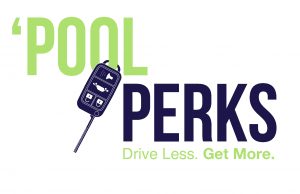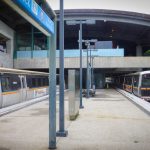City Planning 101 – Traffic, Transportation, and TDM
One of the first questions we often hear is “What does Livable Buckhead do?” It’s a complicated question and I find myself responding with our most basic goal – “We try to get commuters out of their cars and onto MARTA, carpools, bikes, or walking.”
What I want to talk about is why. There are a lot of great reasons that might make a whole lot more sense as an explanation for why we do what we do, but a complicated question has a complicated answer. Let’s start by nailing down exactly what the problem is that our work at Livable Buckhead attempts to solve: Traffic. It’s bad for Atlantans who drive and for those who don’t, because we all have to breathe that polluted air (a large part of the funding for our work comes from a Federal grant to improve air quality.) And it’s bad for people who can’t drive because their buses are subject to that same traffic. For those whose situation means they have to drive because they’ll waste their money burning gas while idling. Sitting in traffic is bad for our mental and physical health, bad for the environment, and we’re paying money to do it. It’s a vicious cycle.
“Once wheeled traffic is treated as the chief concern of planning, there will never be enough space to keep it from becoming congested, or a high enough residential density to provide enough taxes sufficient to cover its exorbitant demands.
The assumed right of the private motor car to go any place in the city and park anywhere is nothing less than a license to destroy the city.”
— Lewis Mumford, 1961
Traffic is essentially a very simple problem of space allocation, if you’ve ever looked at the empty interstate at night you see why. There’s plenty of space to move people, just not all at once. Driving ourselves to work alone is terribly inefficient: a 4 seat car is 1/4 full on every trip, and takes up far more road space than necessary. To make matters worse, every additional car that enters the interstate will cause everyone behind them to wait an exponentially larger amount of time than the car that entered before them. The silver lining here is that for every person who chooses not to drive to work, traffic moves exponentially faster. There’s a lot of research out there on how and why this works, but one thing we need to absorb and communicate to our elected officials is that widening highways is just an expensive way to stay where we are – it’s called ‘induced demand’ and the sooner we learn this lesson, the sooner we can start to make real progress in getting un-stuck from our award-winning commutes. Carpooling is another super-simple way to make a dent in traffic, and if you ride to work with just one other person you’ve effectively doubled your gas mileage!
I’ve made arguments up to this point about how small individual choices can have outsized effects on the larger commute patterns for the rest of the city, so now we can talk about what Livable Buckhead does: It’s called TDM, “Transportation Demand Management.” The idea is that we can help people with commutes that might be easy to change, we also connect commuters with incentive programs that might make it easier to make that choice to switch to walking, biking, or transit. Furthermore, we work with employers to align company benefits packages so that the ‘greenest’ way to work is also the most economical.
Your employees and tenants can reach out to us at any time to get more information on how to make the switch to a clean commute, and we’ll be happy to send a no-pressure review of the options. We’ll apply our knowledge of Atlatna’s transportation systems and local expertise, and even ride along with commuters unfamiliar with the route. We can recommend apps and resources to make sure they’re armed for any eventuality. We can even connect your employees with programs and incentives designed to make the switch rewarding, like getting $5 for every day they log a clean commute up to $150; and 5 free, guaranteed rides home per year – in case of the unexpected. Employees in two-person carpools can get a $20 gas card from Livable Buckhead each month, and carpools of three or more can earn $40-60! We’ll even help facilitate the carpool matching within your organization.
I’ll leave you with one last reason to explore making a switch: Happiness. Driving alone to work every day isn’t just one of the single worst environmentally harmful things you can do, it’s also more stressful than any of the alternatives. Studies have shown that a 20-minute increase in your commute time makes you as miserable at a 19% cut in pay. In transportation research, the freedom people discover is referred to as ‘found time’ and you can use it to eat, sleep, catch up on news articles, podcasts or even just to get a jump on emails on your commute.
As a car-free Atlantan myself, I can attest that sitting on 75/85 is something I’m perfectly happy never doing again.






